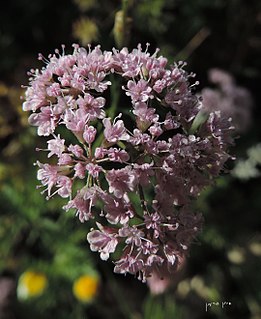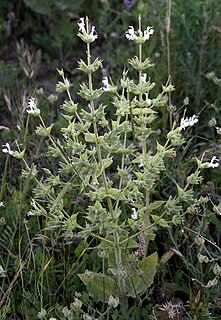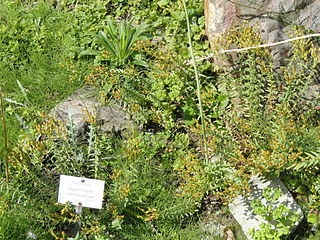
Lolium persicum is a species of flowering plant in the family Poaceae. It is referred to by the common names Persian darnel or Persian ryegrass, and is an annual grass. It has an upright stem, branching from a reddish base, up to 45 cm tall. Its leaves are lower surface glossy, dark green, 6 mm wide.

Isatis is a genus of flowering plants in the family Brassicaceae, native to the Mediterranean region east to central Asia. The genus includes woad. Due to their extremely variable morphology, the Asian species in particular are difficult to determine; the only reliable diagnostic feature is the ripe fruit. They are (usually) biennial or perennial herbaceous plants, often bluish and hairless or downy hairy with the upright stem branched.

Chaetosciadium trichospermum is a species of flowering plant in the Apiaceae, the only species of the genus Chaetosciadium. It is native to Iraq, Lebanon, Syria, Palestine and Saudi Arabia. It is common in Israel, where it is known as שַׂעֲרוּר שָׂעִיר.
Lactuca orientalis is a Eurasian species of plant in the dandelion tribe within the Asteraceae. It is widespread across the Middle East and southern Asia as far east as Tibet.
Trigonosciadium is a genus of five species in the Apiaceae. Trigonosciadium brachytaenium is endemic to Iran, whereas T. tuberosum and T. viscidulum grow in Iran, Anatolia and Iraq.

Echinops adenocaulos is a species of flowering plant in the sunflower family, Asteraceae. It is native to Israel, Palestine, Jordan, Syria, and Lebanon.
Lasiurus is a genus of Asian and African plants in the grass family, Poaceae, found primarily in arid regions. The only known species is Lasiurus scindicus, native to drier regions of northern Africa and southwestern Asia, from Morocco and Mali to India.

Salvia macrosiphon is a species of flowering plant in the mint family, Lamiaceae. It is native to Iraq, Iran, Pakistan, Afghanistan, Transcaucasia, and Turkey, where it grows at the edges of fields. It is a perennial herb with a white corolla and ovate nutlets. It flowers in May and fruits from June onwards. Although the plant is similar to S. spinosa, it differs in that it has narrower leaves and calyces, is less indurate and has less spiny fruiting calyces, and possesses a longer corolla tube.

Notholirion is a small Asian genus of bulbous plants in the lily family, Liliaceae. It is closely related to Lilium, but each individual flowers only once, and then dies after producing offsets. The bulb is covered by a tunic. Leaves are basal, produced in autumn and winter.

Salvia judaica is a species of flowering plant in the Lamiaceae family. It is a perennial commonly called Judean sage that is native to Mediterranean woodlands and shrublands, with violet flowers blooming from April–June.

Hypericum rumeliacum is a species of flowering plant in the family Hypericaceae, native to southeastern Europe.
Bukiniczia cabulica is a plant in the plumbago or leadwort family, Plumbaginaceae. It is the sole species in the monotypic genus Bukiniczia. It is a biennial native to Afghanistan and Pakistan. It forms a basal rosette of leathery leaves, growing a stem with pink flowers in its second year.
Alyssopsis is a genus of flowering plants in the family Brassicaceae.

Narcissus gaditanus is a species of the genus Narcissus (daffodils) in the family Amaryllidaceae. It is classified in Section Juncifolii, and is native to the southern Iberian Peninsula.
Allium cassium is a species of flowering plant in the Amaryllidaceae family. It is a wild onion native to Turkey, Lebanon, Israel, and Cyprus.

Fritillaria gibbosa is a species of herbaceous perennial plant in the lily family Liliaceae. It is native to Afghanistan, Iran, Pakistan, Turkmenistan, and Transcaucasia.

Acantholimon libanoticum(Lebanese prickly thrift, غملول لبناني) is a plant in the family Plumbaginaceae first described by Pierre Edmond Boissier. It is native to Western Asia from Turkey to Syria and Lebanon.
Hypericum pubescens is a perennial herb in the Hypericaceae family. It is in the section Adenosepalum.
Asperula breviflora is a species of flowering plant in the family Rubiaceae. It was described in 1849 and is endemic to Syria.

Goniolimon tataricum is a species of flowering plant in the genus Goniolimon, family Plumbaginaceae. It is called German statice, Tatarian sea-lavender, Tartarian statice or just statice. It is native to Albania, Algeria, Bulgaria, Greece, Kazakhstan, the North Caucasus, Romania, Southern Russia, Tunisia, Ukraine and the former Yugoslavia. It is planted in gardens as a border and ground cover, and also used in the cut flower industry.












